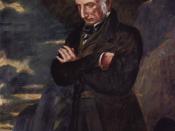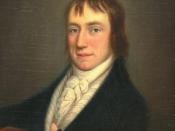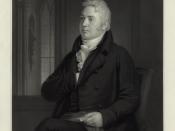"I have owed to them, in hours of weariness"
The city is a place of sterility of chaotic attacks on people's very souls. In the 1790s, as well as today, the city was inhospitable to those of the population who needed freedom and natural life to thrive. William Wordsworth was one such person; living in a city took something from him. The city robbed him of part of his will to live; a will he could only replenish trough the experience of nature and, for a time, the memories of such experiences.
Wordsworth's love of Nature reflected in his poems. He believed that happiness comes from noticing and enjoying the moments that comprise all of human existence. This love of nature and life can be seen through out all of William Wordsworth's poems. He shows this love in either of two ways. The first is by creating the natural world in the readers mind through intense imagery.
The second is by creating the opposite, the world of the cities, and showing how nature can cure one of any spiritual or mental harm the stifling city has caused. From his earliest boyhood, he lived close to the beautiful objects of nature. However, at the time, he did not realize that his character had been altered by these influences.
This change in William Wordsworth's character can best be seen from an expert from one of William Wordsworth's greatest poems, Tintern Abby.
And now, with gleams of half-extinguished thought,
With many recognitions dim and faint,
And somewhat of a sad perplexity,
The picture of the mind revives again:
While here I stand, not only with the sense
Of present pleasure, but with pleasing thoughts
That in this moment there is life and food
For future years. And so I dare to hope,
Though changed, no doubt, from what I was when first
I came among these hills; when like a roe
I bounded o'er the mountains, by the sides
Of the deep rivers, and the lonely streams,
Wherever nature led: more like a man
Flying from something that he dreads, than one
Who sought the thing he loved. For nature then
(The coarser pleasures of my boyish days,
And their glad animal movements all gone by)
To me was all in all. (266, 59-76)
In these lines, William Wordsworth describes a change in himself that took place because of time; he grew older. However, William Wordsworth also describes his love of nature and the fact that no matter how many years went by, the love and awe he feels for life will never leave him. In addition, through that ever enduring love he can almost recapture his "boyish days, And their glad animal movements." (266, 74-75) Moreover, in that recapturing of his youth is the change he went through, he was given a gift. William Wordsworth received the most precious of all nature's gifts, a child like awe of all things.
Wordsworth's writings sprang from experiences he had with nature. It seems that anytime he was submerged completely in nature, words sprang from him in fountains of inspiration and beauty. However, these events in William Wordsworth's life where preceded by events of pain and spiritual hard ship. The war that had begun for the defense of liberty developed into a war of aggression. Wordsworth and Dorothy set up a house together at Racedown in Dorsetshire. Under the influence of the beautiful country around him, he recovered his serenity. His early faith returned, but it was a faith deepened by the suffering that he had undergone. (Rasnake) He was especially fortunate in having his sister Dorothy. Towards the end of 1795, another influence entered William Wordsworth's life. He met Samuel Taylor Coleridge at the house of a friend in Bristol. The two poets became very much attached to one another. In July 1797, Wordsworth and his sister moved to Alfoxden, about three miles from Nether Stowey, where Coleridge and his wife were living. The friends met almost daily, and discussed the theory of their art, while each was inspired to write by the enjoyment of the other. Together they resolved to settle the expenses of a walking tour to Linton by means of a poem to be published in The Monthly Review. From this came not only Coleridge's Ancient Mariner, but also the whole of the Lyrical Ballads, which include some of William Wordsworth's best work. The years from 1802 to 1807 are when his next volumes were published. Most of The Prelude was composed in those years. A visit to Scotland provided suggestions for some of his most beautiful lyrics, while his intense interest in politics found expression in the Poems Dedicated to National Liberty and Independence. In 1805, Wordsworth lost his brother by shipwreck. The loss of his brother influenced him, as is heard in the Ode: Intimations of Immortality and the mournful Stanzas. (MacLeod)
As a boy, he was aware of a avid pleasure in beautiful scenery. It was from the lasting, unshaken objects of nature that he gathered consolation. He realized the existence of a law free of those formulated by men, and more stable than any that man could invent, for it was the will of God revealed in nature. He treasured the littlest things in nature; for example, the simple color of the forest from a distance, inspirers feelings of peace and youthful energy for Wordsworth. In Tintern Abbey Wordsworth spoke of the healing power of even the slightest memory of undisturbed nature.
"Though absent long,
These forms of beauty have not been to me
As is a landscape to a blind man's eye;
But oft in lonely rooms, and mid the din of towns and cities, I have owed to them,
In hours of weariness, sensations sweet,
Felt in the blood, and felt along the heart,
And passing even into my purer mind
With tranquil restoration; feeling too
Of unremembered pleasure - such, perhaps,
As may have had no trivial influence
On that best portion of a good man's life,
His little, nameless, remembered acts
Of kindness and of love." (266, 24-36)
William Wordsworth's poems show his joy of living and love of Nature. The particular style that he used for his poems came from the aspect of nature. He appreciated all the little things in life and expressed them in his poems. He talked of the forms of shadows of mountains and rocks, the sound of running water, the ocean, and lakes as a masterpiece to him when they glitter in the spring or autumn sunshine. Wordsworth used his incite into the natural world to interpret, to help us to enter into the life of these things, rather than to provide a catalogue of their outward lineaments.
Furthermore, Wordsworth had an intense love for all things natural, his feelings for the manmade world where the opposite. As he described the healing powers of the natural world in Tintern Abbey, he also created an image of the cities he inhabited. His cities seem to suck the very life out of him every day, and if not for the memories of the Abbey he would certainly fail. He created a world of darkness and pain in only a few lines. His words described a place devoid of natural life, and consumed with human trivial needs. This description works well because all people feel the oppressiveness of the city. Therefore, by him bring light to it; many people may have had a small sublime moment and an ultimate realization of why they always felt the strain of the city.
One of William Wordsworth's chief characteristics, both as a poet and a man, was a love for, and respect of, childhood. He remembered his own youth very vividly, and how he had felt a eternal awareness of the Divine power manifesting itself through the beautiful objects of nature. This Idea of youthful innocence is best described in The two-Part Prelude.
"Beloved Derwent, fairest of all the streams,
Was it for this that I, four years' child,
A naked boy, among thy silent pools,
Made one long bathing of a summer's day..." (300,16-19)
Early in March 1798 Wordsworth undertook a long philosophical poem, which he hoped would enlighten many people, to be entitled The Recluse; or, Views on Man, on Nature, and on Human Life. He decided that he should first try to see if he was capable of writing a work that may take on a life of its own, and furthermore a work that might influence many lives. The result of this self-examination was The Prelude. It was Wordsworth's purpose to make The Prelude an introduction to The Recluse; but, because the new poem exceed the original plan, eventually reaching the length of fourteen books and eight thousand lines, it was deemed not suitable for that purpose. However, The Prelude stands independently as an account of the origin and development of the poetic mind and as the most vital work of Wordsworth's genius. At Goslar in the winter of 1798-99, Wordsworth set to work on the poem of his early life by recalling all that nature had done for him in childhood. After his return to England in May 1799, the inspiration came to him to dedicate to Coleridge the poem now growing in his mind. The dedication to his friend was a great incitement; without it, he might not have been able to finish the poem. Wordsworth included his experience in France. This called for eight more books after the fifth, all of which were brought to the finishing point in June 1805. The poem that was published in 1850 differs widely from the one completed in 1805. When Mary Wordsworth had it published, she appropriately called it The Prelude. (Rasnake)
It is an idealization of William Wordsworth's life. In it, William Wordsworth's insights of the essence of nature and power of the poetic mind transforms whatever is personal into the universal. In The Prelude, one can see all of Wordsworth's ideas that he lived his life by come together in an incredible work. It was also an attempt at creating a map or plan to reach the same state of mind he was able to attain.
Wordsworth did not create when he wrote; he expressed the beauty of the things he saw in words. That is why his work is so vividly real, because it is simply a refection of the real world. The rift between the manmade and the natural is not one that Wordsworth created. The rift is one that society has twisted, and Wordsworth brought the separation to light. To understand William Wordsworth's writing is to open a door to the natural world and to become one with all of life. If all of humankind could just grasp this concept that we are all a part of nature, and that we need it to live, then the world would truly be the utopia Wordsworth once sought. "On that best portion of a good man's life, his little, nameless, remembered acts of kindness and of love." (266, 34-36)
Work Cited
Wordsworth, William. "Tintern Abbey" Romanticism. Ed. Duncan Wu. Blackwell Publishers, 2000. 265-269.
Wordsworth-William, Wordsworth -Jonathan , The Prelude: 1799, 1805, 1850 (A Norton Critical Edition) Norton, W. W. & Company, Inc,1990.
Rasnake, David "William Wordsworth: A Hyper textual Biography ." The Wordsworth Page. 31 March 1998 .
MacLeod, Laura "William "The Interminable" Wordsworth." 1996-97. .



Beautifully expressed
A well researched, beautifully written essay. The writer has really taken a lot of pains to explain his topic to his readers. He really knows what he's talking about. Kudos to him.
0 out of 0 people found this comment useful.